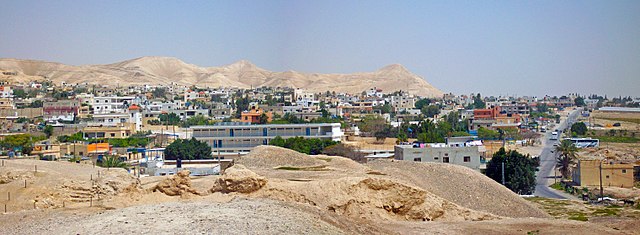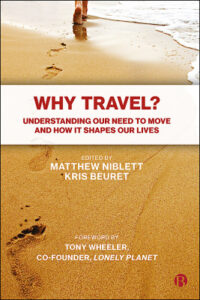Sedentism: The great settling down?

Modern-day Jericho, one of the oldest continuously inhabited cities in the world, is located in the region where some of the earliest permanent human settlements have been found. Image licensed under Creative Commons via Wikimedia https://creativecommons.org/licenses/by-sa/3.0/
Most evolutionary biologists agree that humans evolved in the savannah of eastern Africa around 300,000 years ago (BP), and for most of that time we have been a nomadic species, settling for short periods of time before moving with the seasons and climate in search of sources of food and water. But the nearly 7 billion humans alive today have a very different lifestyle: less than one per cent of the world’s population are now nomadic, with the rest of us living in permanent settlements, and over 50% of people in large urban centres. This practice of living in one place for a long time has been termed ‘sedentism’, and its arrival marks one of the most momentous changes our species has ever undergone.
The great shift from nomadism to sedentism seems to have occurred relatively recently, with the first known permanent settlements dating back to around 15,000 BP (i.e. less than 5% of the time that Homo sapiens has been around).[1] The Natufian culture, from the Levant region of the near east, are the earliest settled culture yet found. They were hunter-gatherers who, over time, domesticated dogs and hogs, and developed some agriculture of cereals.[2] However, theirs was not a simple one-way step from nomadism to settled farming, since it appears that the Natufians gradually changed their way of life over thousands of years. They adapted to changing environmental conditions, settling during periods of relative abundance and becoming more nomadic when the climate was more challenging. Other examples of early sedentism from China and the Americas show a complex picture of changing lifestyles, not a linear progression from nomadic hunter-gathering to settled farming.[3] Nevertheless, the overall pattern over the last 10,000 years has overwhelmingly been towards a sedentary human population[4] with societies based on agricultural food production.
Agriculture and sedentism are closely linked, but agriculture is not necessary for sedentism: the Natufians and numerous other groups have been sedentary hunter-gatherers. Farming itself is not necessarily advantageous over foraging: early agricultural crops were nutritionally less beneficial than foraged food (and worse for dental health), and the amount of food produced per hour of labour was lower. Added to this, sedentism has negative impacts on health due to heightened risks of disease [5]. Given these detrimental effects of sedentism and agriculture, it may seem surprising that both rose so quickly to dominate human life. According to some archaeologists, the key may lie in the combined effects of climate change, population growth, and technological innovation.[6] It also seems to be the case that sedentism and agriculture encourage each other in a cycle that is hard to escape from once it has begun.[7]
Whichever the reason for the onset of and relatively rapid conversion from nomadism to sedentism, it is clear that the consequences of this change have been enormous, far-reaching and sometimes unexpected. The possibility of accumulation of food stores and possessions, and the growth in human population enabled by agriculture and sedentism have tended to co-evolve with the development of larger, hierarchical societies with all the social, political, and economic consequences that entails, from the development of writing, astronomy, and technological progress to structured religion, money, war, and social classes.[8]
Although many of these developments could be considered as having benefits, some thinkers have postulated that our original state as nomads was happier and more in tune with our true nature and the state in which our species evolved. For example, in his book The Songlines, Bruce Chatwin discusses some of the ideas of the seventeenth-century mathematician and theologian Blaise Pascal, who believed that humans need to travel in order to distract us from the “natural unhappiness of our weak mortal condition.” Chatwin suggests that this “need for the distraction, our mania for the new, is, in essence, an instinctive migratory urge.” He also quotes the 14th century Arabic philosopher Ib’n Khaldun as saying that “the Desert People are closer to being good than settled peoples because they are closer to the First State.” Chatwin argues that perhaps the violence humans inflict on each other evolved as a defence against predators: an instinct which in settled societies we have turned against each other.[9] Author Tony Hiss suggests in his book In Motion that with sedentism we might even have lost touch with a way of thinking that evolved from our experience as a migratory species on the open savannah: a capacity to open the mind up on all levels to new experiences. He calls this state ‘Deep Travel’ and notes that this “ancient, innate, ground-shifting variant of ordinary waking consciousness” is often activated in us modern sedentists “by being in motion and travelling.”[10]
And yet for all that sedentism has changed our societies and ways of thinking, it has not been the death of human travel. We may have settled down but we have not stopped travelling; rather we have changed our travel habits, generated fresh motivations and new types of journeys: we travel for trade, diplomacy, pilgrimage, work, leisure and out of pure curiosity. In his book Quest, renowned biochemist Professor Charles Pasternak argues that it is our propensity to quest – to search and to exercise our curiosity – that defines our species, and that the advent of sedentary civilization has in fact enabled humanity to travel further, physically and intellectually, than ever before.[11] Our journeys today structure our daily lives and shape the economics and politics of the world.
To explore this phenomenon, the Independent Transport Commission is running a project entitled Why Travel? which aims to understand the motivations that underpin human travel. A key area of study for the project is how travel is grounded in the very origins of humanity and the resulting relationship that travel has with our physical and mental state (the ITC’s forthcoming book will include chapters by Professor Pasternak and Tony Hiss, which will examine these issues in detail). The project explores these questions from a range of perspectives across the arts, sciences and humanities with the aim of informing better decision making to improve travel and transport into the future. For more information about the project, including news stories and expert views, see www.whytravel.org.
See also:
The Mind topic page
Biology topic page
Songlines blog post
Notes
[1] https://www.sciencedaily.com/releases/2017/12/171205091509.htm
[2] https://www.sciencemag.org/news/2017/03/when-did-humans-settle-down-house-mouse-may-have-answer
[3] https://www.thoughtco.com/sedentism-ancient-process-building-community-172756
[4] Indeed there is now concern about the sedentary nature of our individual day-to-day lives, in the sense that many of us are increasingly physically inactive. The World Health Organisation has claimed sedentary lifestyles to be a leading cause of disease and disability: https://www.who.int/mediacentre/news/releases/release23/en/
[5] http://bruceowen.com/emciv/a341-09s-05-AgricultureSedentismTheory.pdf
[6] https://www.sciencedirect.com/science/article/pii/S0167268115001985
[7] The relationship between agriculture and sedentism is complex but it seems that if a group becomes sedentary under favourable environmental conditions, they may over time develop some agriculture, which encourages population growth, which itself further encourages agriculture (since foraging cannot support a large population). This cycle is explained neatly here: http://bruceowen.com/emciv/a341-09s-05-AgricultureSedentismTheory.pdf
[8] Researchers have found that the relationship between agriculture and hierarchy is not a simple causal one. Material changes to the environment do not necessarily drive social evolution; sometimes it is the other way round, sometimes the two ‘co-evolve’, driving each other, and sometimes they appear to be independent of each other. https://phys.org/news/2018-03-intensification-agriculture-social-hierarchies-evolve.html
[9] Quotations from The Songlines by Bruce Chatwin (1987) p. 161, p.196 and p.219
[10] In Motion: The Experience of Travel by Tony Hiss (2010) p.9 and p.6
[11] Quest: The Essence of Humanity by Charles Pasternak (2003)


